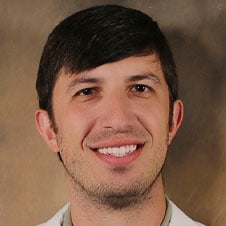As a medical student, do you ever wonder what it’s like to specialize in general surgery? Meet Boris Cehajic, MD, a general surgeon and a featured doctor in the AMA’s “Shadow Me” Specialty Series, which offers advice directly from physicians about life in their specialties. Check out his insights to help determine whether a career in general surgery might be a good fit for you.
The AMA Specialty Guide simplifies medical students’ specialty selection process, highlights major specialties, details training information, and provides access to related association information. It is produced by FREIDA™, the AMA Residency & Fellowship Database®.
Learn more with the AMA about the medical specialty of general surgery.
“Shadowing” Dr. Boris Cehajic
Specialty: General surgery.
Practice setting: Private practice group within a hospital.
Employment type: Employed by Hattiesburg Clinic, which is a member of the AMA Health System Program that provides enterprise solutions to equip leadership, physicians and care teams with resources to help drive the future of medicine.
Years in practice: Six.
A typical day and week in my practice: A typical work week for me includes two days doing bigger operations at the hospital, two days in clinic and one day at the surgery center doing smaller cases. I am on call at the hospital about one day per week and one weekend per month on average.
The most challenging and rewarding aspects of general surgery: The most challenging part is that there's a new surprise every day and you must be ready to deal with a wide variety of surgical problems. Our local population is generally composed of sicker-than-average patients with more medical comorbidities that can significantly impact their outcomes.
The most rewarding part is fixing someone's problem—especially for those coming to you in their most vulnerable state, such as after a new colon or breast cancer diagnosis.
The impact burnout has on general surgery: There is a high burnout rate in general surgery. Long work hours and work-related stress impacts the work, and it can potentially impact patient care. It can also spill over into your personal life, leading to depression, substance abuse, strained relationships and even suicide.
How Hattiesburg Clinic is reducing physician burnout: Hattiesburg Clinic is focused on combating burnout. It is constantly recruiting to overcome staffing shortages and organizing employee wellness programs and social gatherings for camaraderie.
How my lifestyle matches, or differs from, what I had envisioned: I can't say I truly remember my expectations, but I think I'm achieving the work-life balance I want. I am fortunate to work with seven partners with whom I share call responsibilities and who I can go to for help or advice whenever I need it. This also gives me some flexibility with scheduling when I need it.
Skills every physician in training should have for general surgery but won’t be tested for on the board exam: Other than the technical skills to perform operations, every physician should have humility, focus and compassion. Know when to ask for help! You must maintain focus and patience during cases, sometimes for a few hours, to help avoid complications that are within your control. Take time to connect with your patients, as this will provide perspective on how the work you are doing makes an impact on their lives.
Books, podcasts or other resources every medical student interested in general surgery should be reading:
- The House of God, by Samuel Shem, MD. Although it is fictional, this book gives students a realistic look at life during their intern year.
- Fischer's Mastery of Surgery, by Josef E. Fischer, MD. This is the best, most comprehensive reference guide for surgical operations.
- “Behind the Knife” podcast. This is a great resource for residents learning to navigate residency, oral board preparations, career planning and more.




